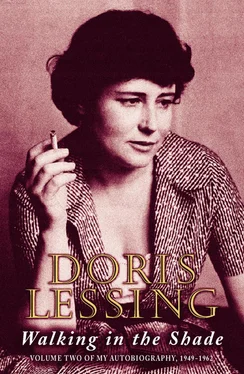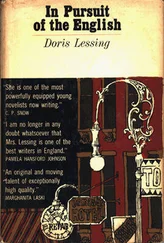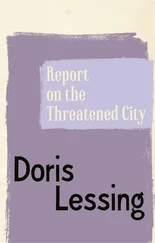1 ...8 9 10 12 13 14 ...27 My mother was … but I have forgotten which archetype my mother was. She was one, I know. Mrs Sussman would often bring some exchange to a close: She, he, is such and such an archetype … or is one at this time. I, for example, at various times was Electra, Antigone, Medea. The trouble was, while I was instinctively happy with the idea of archetypes, those majestic eternal figures, rising from literature and myth like stone shapes created by Nature out of rock and mountain, I hated the labels. Unhappy with communism I was unhappiest with its language, with the labelling of everything, and the vindictive or automatic stereotypes, and here were more of them, whether described romantically as ‘archetypes’ or not. I did not see why she minded my criticisms, for she liked the dreams I ‘brought’ her. Psychotherapists are like doctors and nurses who treat patients like children: ‘Just a little spoonful for me.’ ‘Put out your tongue for me.’ When we have a dream, it is ‘for’ the therapist. Often it is: I swear I dreamed dreams to please her, after we had been going along for a while. But at my very first session she had asked for dreams, preferably serial dreams, and she was pleased with my ancient-lizard dream and the dreams I was having about my father, who, too shallowly buried in a forest, would emerge from his grave, or attract wolves who came down from the hills to dig him up. ‘These are typically Jungian dreams,’ she would say gently, flushed with pleasure. ‘Sometimes it can take years to get someone to dream a dream on that level.’ Whereas ‘Jungian’ dreams had been my night landscape for as long as I could remember, I had not had ‘Freudian’ dreams. She said she used Freud when it was appropriate, and that was, I gathered, when the patient was still at a very low level of individuation. She made it clear that she thought I was. *
‘Jungian dreams’ – wonderful, those layers of ancient common experience, but what was the use of that if I had to go to bed with the covers over my head at the news my mother was about to arrive? Here I was. Here I am, Mrs Sussman. Do what you will with me, but for God’s sake, cure me.
I needed support for other reasons.
One of them was my lover. Moidi Jokl suggested that I should go with her one evening to a party, and there I met a man I was destined – so I felt then – to live with, and to have and to hold and be happy with.
Yes, he had a name. But as always, there is the question of children and grandchildren. Since Under My Skin came out, I have met not a few grandchildren, children, of my old mates from those far-off times and learned that the views of contemporaries about each other need not share much with the views of their children. Whole areas of a parent’s, let alone a grandparent’s, life can be unknown to them. And why not? Children do not own their parents’ lives, though they – and I too – jealously pore over them as if they hold the key to their own.
I say to a charming young man who has come to lunch to discuss his father, ‘When James was working on the mines on the Rand –’
‘Oh, I’m sure he never did that,’ comes the confident reply.
To another: ‘You didn’t know your father was a great lover of women?’ A faindy derisive smile, meaning: What, that old stick? So then of course you shut up; after all, it has nothing to do with him.
I will call this man Jack. He was a Czech. He had worked as a doctor with our armies throughout the war. He was – what else? – a communist.
He fell in love with me, jealously, hungrily, even angrily – with that particular degree of anger that means a man is in conflict. I did not at once fall in love with him. At the start, what I loved was his loving me so much: a nice change after Gottfried. The way I saw this – felt this – was that now I was ready for the right man: my ‘mistakes’ were over, and I was settled in London, where I intended to stay. All my experiences had programmed me for domesticity. I might now tell myself – and quite rightly – that I had never been ‘really’ married to Frank Wisdom, but for four years we had a conventional marriage. Gottfried and I had hardly been well matched, but we had lived conventionally enough. The law and society saw me as a woman who had had two marriages and two divorces. I felt that these marriages did not count. I had been too young, too immature. The fact that the bouncy, affectionate, almost casual relationship I had had with Frank was hardly unusual – particularly in those war years, when people married far too easily – did not mean I did not aspire to better. With Gottfried it had been a political marriage. I would not have married Gottfried if the internment camp was not still a threat. Then, people were always marrying to give someone a name, a passport, a place; in London there were organizations for precisely this – to rescue threatened people from Europe. But now, in these luckier times, people have forgotten that such marriages were hardly uncommon. No, my real emotional life was all before me. And I had all the talents needed for intimacy. I was born to live companionably – and passionately – with the right man, and here he was.
Jack had been one of thirteen children, the youngest, of a very poor family in Czechoslovakia. He had had to walk miles to school and back – just like Africans now in many parts of Africa. They scarcely had enough to eat or to cover themselves with. This was a common enough story, then, in Europe – and in some parts of Britain too: people don’t want to remember the frightful poverty in Britain in the twenties and thirties. Jack had become a communist in his early teens, like all his schoolfellows. He was a real communist, for whom the Party was a home, a family, the future, his deepest and sanest self. He wasn’t at all like me – who had had choices. When I met him, his closest friends in Czechoslovakia, the friends of his youth, the top leadership of the Czech Communist Party, had just been made to stand in the eyes of the world as traitors to communism, and then eleven of them were hanged, Stalin the invisible stage manager. For Jack it had been as if the foundations of the world had collapsed. It was impossible for these old friends to have been traitors, and he did not believe it. On the other hand, it was impossible for the Party to have made a mistake. He had nightmares, he wept in his sleep. Like Gottfried Lessing. Again I shared a bed with a man who woke from nightmares.
That was the second cataclysmic event of his life. His entire family – mother, father, and all his siblings, except one sister who had escaped to America – had died in the gas chambers.
This story is a terrible one. It was terrible then, but taken in the context of that time, not worse than many others. In 1950 in London, everybody I met had come out of the army from battlefields in Burma, Europe, Italy, Yugoslavia, had been present when the concentration camps were opened, had fought in the Spanish war or was a refugee and had survived horrors. With my background, the Trenches and the nastiness of the First World War dinned into me day and night through my childhood. Jack’s story was felt by me as a continuation: Well, what can you expect?
We understood each other well. We had everything in common. Now I assess the situation in a way I would then have found ‘cold’. I look at a couple and I think. Are they suited emotionally … physically … mentally? Jack and I were suited in all three ways, but perhaps most emotionally, sharing a natural disposition towards the grimmest understanding of life and events that in its less severe manifestations is called irony. It was our situations, not our natures, that were incompatible. I was ready to settle down for ever with this man. He had just come back from the war, to find his wife, whom he had married long years before, a stranger, and children whom he hardly knew.
Читать дальше












